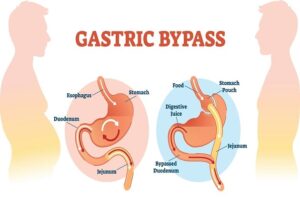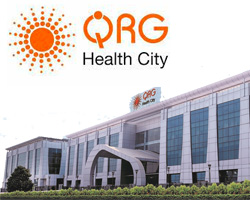Gastric Bypass Surgery
Gastric bypass is surgery that helps you lose weight by changing how your stomach and small intestine handle the food you eat. After the surgery, your stomach will be smaller. You will feel full with less food. The food you eat will no longer go into some parts of your stomach and small intestine that absorb food. Because of this, your body will not get all of the calories from the food you eat.

Who Needs Gastric Bypass Surgery
Gastric Bypass Surgery is typically recommended for individuals who meet certain criteria, including:
- Body Mass Index (BMI): Candidates usually have a BMI of 40 or higher, or a BMI of 35-39.9 with obesity-related health conditions such as diabetes, hypertension, or sleep apnea.
- Failed Weight Loss Attempts: Candidates should have a documented history of attempting to lose weight through diet, exercise, and other non-surgical methods, without achieving significant and sustainable results.
- Health Conditions: Individuals with obesity-related health issues that significantly impact their quality of life and overall health may be considered for gastric bypass surgery.
- Commitment to Lifestyle Change: Candidates must demonstrate a willingness to make long-term changes to their diet and exercise habits to ensure the success of the surgery.
When to See a Specialist
If you are struggling with severe obesity and have been unsuccessful in your attempts to lose weight through traditional methods, it might be time to consider consulting a medical specialist. A bariatric surgeon can evaluate your individual situation, discuss your options, and determine if gastric bypass surgery is a suitable choice for you.
Procedure
- Preparation: Before the surgery, you will undergo a thorough medical evaluation and may need to follow a special diet to prepare your body for the procedure.
- Anesthesia: The surgery is performed under general anesthesia to ensure your comfort and safety.
- Creation of Pouch: The surgeon will divide the stomach into a small upper pouch and a larger lower pouch, using surgical staples to create a separation.
- Roux-en-Y Reconstruction: The surgeon will then connect the small intestine to the newly created pouch, allowing food to bypass a portion of the stomach and the first part of the small intestine.
- Completion: The remaining portion of the stomach is connected to the small intestine further down the digestive tract, allowing digestive juices to mix with the food.
- Closing Incisions: After the procedure, the incisions are closed, and you will be monitored in a recovery area.
Road to Recovery
The recovery period after gastric bypass surgery typically involves a hospital stay of a few days, during which time you will be gradually introduced to a liquid diet and closely monitored for any complications. Over the next several weeks, you will transition to soft foods and then to solid foods, following your surgeon’s guidance. Regular follow-up appointments and a commitment to dietary and lifestyle changes are crucial for successful long-term results.
Risk Management
While gastric bypass surgery can be highly effective, like any surgical procedure, it carries some risks, including infection, blood clots, complications related to anesthesia, and potential issues with the newly reconstructed digestive system. These risks can be minimized by carefully following your surgeon’s pre-operative and post-operative instructions and attending all recommended follow-up appointments.
Benefits of Gastric Bypass Surgery
- Significant Weight Loss: Patients often experience significant and sustained weight loss, leading to improved overall health and a reduced risk of obesity-related diseases.
- Improved Metabolism: The altered digestive tract can lead to increased metabolic efficiency and reduced hunger.
- Resolution of Health Issues: Many obesity-related health conditions, such as type 2 diabetes, high blood pressure, and sleep apnea, can be improved or even resolved after surgery.
- Enhanced Quality of Life: Weight loss and improved health can lead to increased energy levels, better mobility, and a higher quality of life.
Frequently Asked Questions
1. Will I be able to eat normally after the surgery?
While your eating habits will change, you will be able to enjoy a variety of foods in smaller portions. Your surgeon will guide you on making healthy choices.
2. How long does the surgery take?
The surgery usually takes around 2 to 4 hours, depending on your individual circumstances.
3. Is the weight loss permanent?
Weight loss can be permanent if you commit to a healthy lifestyle, including regular exercise and a balanced diet.
4. Are there any dietary restrictions after the surgery?
Yes, you will need to follow a specific diet plan, starting with liquids and gradually progressing to solid foods. Your surgeon and dietitian will provide guidance.
5. Can I become pregnant after gastric bypass surgery?
Yes, but it’s recommended to postpone pregnancy for at least 12 to 18 months after surgery to allow your body to stabilize and ensure proper nutrition.
Gastric Bypass Surgery
Treatians understand that seeking medical treatment abroad can be a daunting experience for patients and their families. That’s why the company offers end-to-end support to its clients, from the initial consultation to post-treatment care. The company provides personalized treatment plans that are tailored to meet the individual needs of each patient, and its team of dedicated professionals is always on hand to provide guidance and support throughout the entire process. Contact us at +91-7982312582, drop your email [email protected]
- Trauma & intensive care
- Aged Care
- Community Services
- Diagnosis & Investigation
- Medical & Surgical
- Mental Health
- Rehabitation
- Specialised Support Service
Service Recipient Says

After struggling with obesity for years I decided to have gastric bypass surgery in India. Thanks treatians for your support and guidance.
Sophea Cambodia
Gastric bypass surgery completely transformed my life. I feel healthier now.
Nor Malaysia




















I had gastric bypass surgery, and it changed my life. I lose weight, got healthier, and feel amazing now.
Somchai Thailand